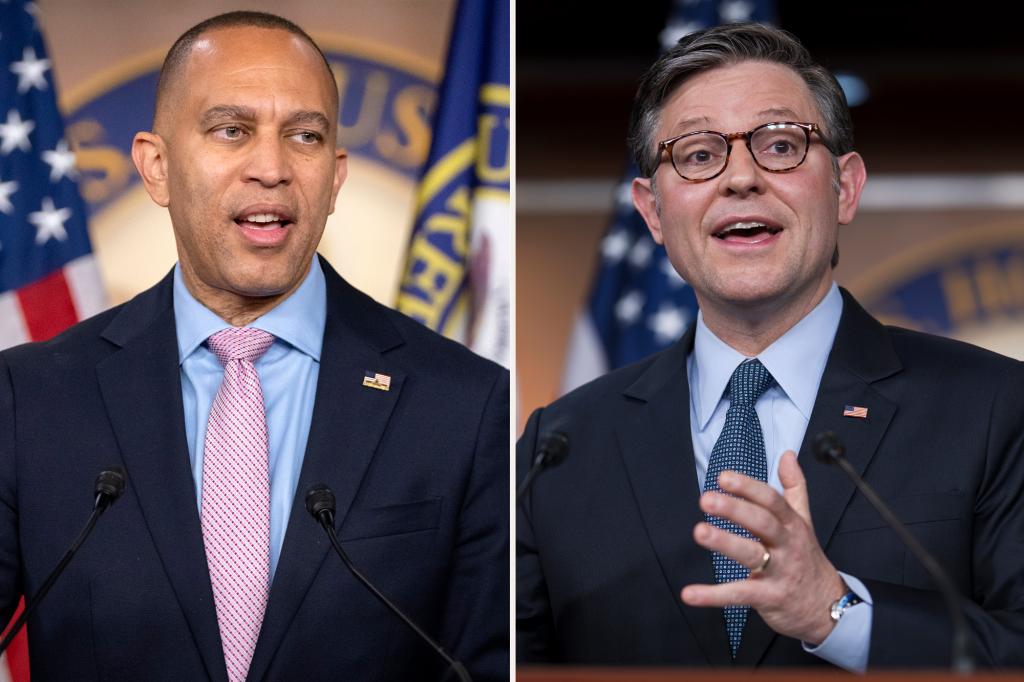The looming threat of a government shutdown before Christmas prompted Congressional leaders to unveil a 1,547-page continuing resolution (CR) late Tuesday. This stopgap measure aims to maintain current government funding levels through March 14, 2025, averting an immediate crisis but setting the stage for a potentially contentious budget battle in the new year. Beyond its primary function, the CR is laden with a diverse array of provisions, touching upon areas ranging from pharmaceutical policy and disaster relief to restrictions on US investments in China and the future of the Washington Commanders’ stadium. This legislative grab-bag reflects the typical end-of-year scramble in Congress, where crucial funding decisions are often bundled with an assortment of unrelated policy riders.
The timing of the CR’s consideration remains uncertain, as House Speaker Mike Johnson has yet to announce a definitive plan for bringing it to a vote. His potential disregard for the 72-hour rule, which allows lawmakers time to review the lengthy text, adds further complexity to the situation. Should the House proceed swiftly, the Senate will be under immense pressure to act quickly on Friday to prevent a government shutdown. This compressed timeline has already sparked criticism from various Republican lawmakers, who have voiced concerns about both the process and the substance of the CR. These complaints span the ideological spectrum, from moderates to the hard-right flank of the party, highlighting the challenge Johnson faces in securing sufficient support for the measure.
Republican dissent centers on a range of issues, including the perceived prioritization of Democratic priorities within the CR, the inclusion of seemingly unrelated add-ons, and the overall lack of fiscal restraint. Some members, like Rep. Marjorie Taylor Greene, have likened the CR to a “three-month omnibus” and warned of the potential consequences of delaying difficult spending decisions. The inclusion of substantial disaster relief funding, while addressing a pressing need, has further fueled concerns about excessive spending and the absence of corresponding offsets. Critics argue that the CR simply postpones a necessary reckoning with the nation’s fiscal challenges, setting the stage for a more difficult and potentially damaging fight in the future.
The CR’s provisions targeting pharmaceutical benefit managers (PBMs) have also drawn fire from the industry. These middlemen in the drug pricing process have long faced scrutiny for their role in driving up costs and potentially benefiting from complex rebate arrangements. The CR seeks to curtail these practices by prohibiting PBMs from tying their compensation to the list price of drugs and requiring them to pass through all rebates and discounts to employers and health plans. While proponents argue these measures will increase transparency and lower drug costs, PBMs contend they will weaken their negotiating power and ultimately lead to higher prices for consumers. This clash of perspectives underscores the ongoing debate over the role of PBMs and the best approach to controlling pharmaceutical spending.
Beyond the immediate implications for government funding and drug pricing, the CR also carries significant political ramifications. Its passage would set the stage for a major spending showdown later in the year, coinciding with President-elect Donald Trump’s first 100 days in office. Congress will face the daunting task of addressing the fiscal year 2025 and 2026 budgets, grappling with the debt ceiling, and navigating the expiration of Trump-era tax cuts. While the inclusion of disaster aid in the CR removes one expensive item from next year’s agenda, it does not resolve the underlying fiscal challenges that continue to plague the nation. The looming battles over spending priorities and deficit reduction are likely to test the newly configured Congress and shape the political landscape for years to come.
The confluence of a potential government shutdown, a massive and complex continuing resolution, and deep divisions within the Republican party creates a challenging political environment for Speaker Johnson. He faces the delicate task of navigating competing demands within his own caucus while simultaneously working with the Senate to avert a shutdown. The tight margins in the House further complicate matters, potentially leaving him vulnerable to internal challenges and undermining his ability to control the legislative agenda. His handling of the CR vote and the subsequent budget battles will be a crucial test of his leadership and could have far-reaching consequences for the political stability of the next Congress.










